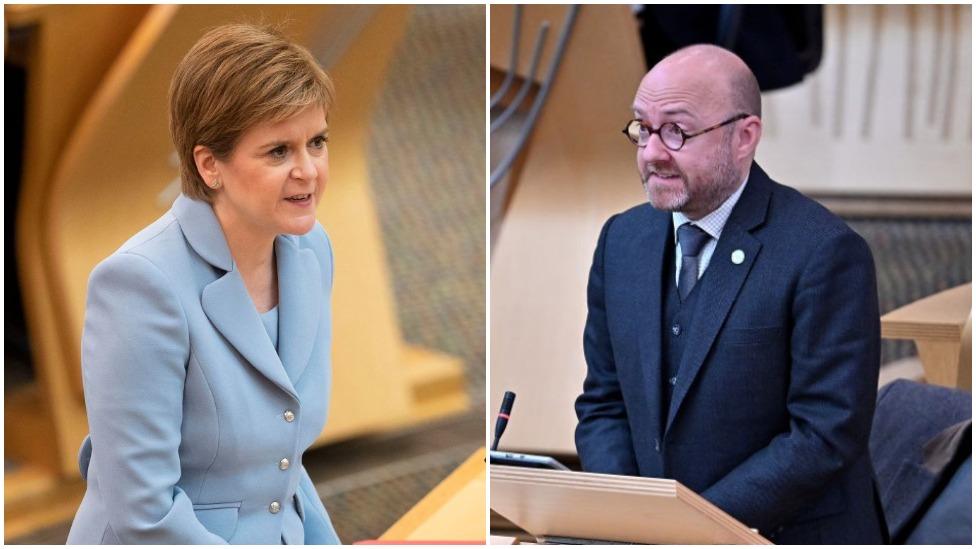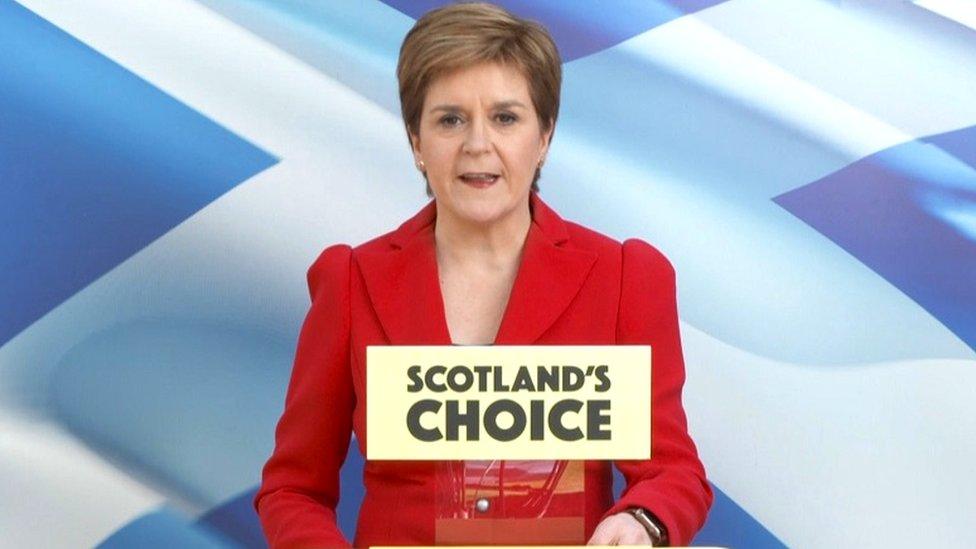SNP discussing formal co-operation deal with Greens
- Published
- comments

First Minister Nicola Sturgeon has been discussing a formal co-operation agreement with the Scottish Greens.
She told MSPs that the SNP and the Greens were exploring different policy areas where they could work together.
Informal talks had begun after the election, she said, and these would now become structured talks with a view to agreeing a formal arrangement.
Although a full coalition deal is not likely, Ms Sturgeon said ministerial jobs for Green MSPs was a possibility.
"Exactly what the content, extent and scope of any agreement will be is what the talks will focus on," she added.
The SNP won 64 seats in the Holyrood election - one short of a majority - and Ms Sturgeon would have a stable majority if she could also rely on the seven Scottish Green MSPs.
Scottish Conservative leader Douglas Ross said the parliament had to choose between spending the next term focused on delivering on voters' priorities or being "distracted about independence".
And Scottish Labour leader Anas Sarwar said the Scottish government had to be more "bold and ambitious" in its plans for recovering from the pandemic, and that his party would work to be a "credible alternative" for voters.
'Exploratory discussions'
Ms Sturgeon said she has had "a series of exploratory discussions" with the pro-independence Greens since the election, and that these informal discussions would now become "structured talks", supported by the civil service, with a view to reaching a formal cooperation agreement.
The talks are expected to conclude before the next parliamentary recess, which is in a month's time.
The first minister said the two parties would discuss specific policy areas where they could cooperate, including the climate emergency and how Scotland could accelerate its progress towards net zero.
She added: "As we embark on this process, we are setting no limits on our ambition.
"So in that vein let me be clear that while this is not a guaranteed or pre-agreed outcome, it is not inconceivable that a cooperation agreement could lead in future to a Green minister or ministers being part of this government.
"The key point for today is that we are both agreeing to come out of our comfort zones to find new ways of working for the common good".
Scottish Greens' co-leader Patrick Harvie said that Green parties across Europe and in countries such as New Zealand had "rolled up their sleeves and worked with other parties to deliver a better future".
This showed that "there is more than one way for government and opposition parties to work together, without losing the ability to challenge one another," he said.
Mr Harvie added: "We believe the people of Scotland want to see grown-up politics like this, and will approach the forthcoming talks in this spirit."
What are opposition parties saying?
Douglas Ross said there were some areas where parties across the chamber could agree and work constructively.
But he added: "Ultimately, as always, this comes down to independence for the SNP".
The Scottish Conservative leader added that the parliament had to choose between "wasting" another five years on independence or using its existing powers to "get things done".
And Mr Sarwar, Scottish Labour's leader, said he was willing to work with anyone in the national interest or on the issues they agreed on.
But, Mr Sarwar said, a "bold and ambitious opposition and a credible alternative" was needed, and called for the Scottish government to be more "bold and ambitious" in its plans for recovering from the pandemic.


This is not a done deal yet but both sides clearly think a formal cooperation agreement is possible.
Weeks of hard bargaining lie ahead as the two sides prepare to enter formal talks.
The SNP will want to maximise the range of areas where they are guaranteed Green support in parliament.
In exchange, the Greens will want to push Nicola Sturgeon to go further and faster in key policy areas like tackling climate change.
With 64 SNP votes and seven from the Greens a cooperation agreement between the two parties would give the Scottish government a very comfortable majority.
That would protect them from ambush in confidence votes, at budget time and when passing other key pieces of legislation.
It would also underline the majority that exists at Holyrood for another independence referendum.
But if they stop short of a full coalition, there would be areas where the Greens could still vote against the government it otherwise supports.

The talks emerged shortly before Ms Sturgeon set out her government's plans for its first 100 days in office.
She told MSPs that recovering from the Covid pandemic would be the immediate priority.
Over the next three weeks, the first minister said, the government would set out its expectations for how the Covid restrictions levels system would be wound down after the pandemic, allowing a return to "a much greater degree of normality".
Tackling climate change was another priority, she said, and the first minister also outlined policies to tackle child poverty and inequality.
And she said legislation to create a national care service will be introduced in the next 12 months, with a view to having the service operational by the end of this parliament.
"This will be, in my view, the most important public sector innovation since the establishment of the National Health Service," she said.
Ms Sturgeon also repeated her pledge to hold an independence referendum once the pandemic is over.
She said the election result had delivered a "substantial majority" in parliament for an independence referendum within the current parliamentary term, adding that there could be no justification for the UK government seeking to block that mandate.
- Published9 May 2021
